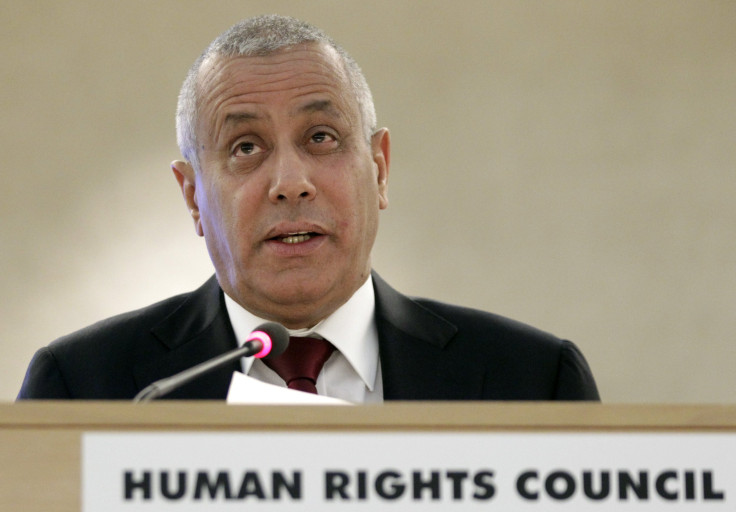Libyan Parliament Sacks PM After Tanker Escapes Rebel-Held Port

By Ulf Laessing and Feras Bosalum
TRIPOLI, March 11 (Reuters) - Libya's parliament voted Prime Minister Ali Zeidan out of office on Tuesday after rebels humiliated the government by loading crude on a tanker that fled from naval forces, officials said, in a sign of the worsening chaos in the OPEC member state.
Libyan gunboats later chased the tanker along Libya's eastern Mediterranean coast and opened fire, damaging it, a military spokesman said. Italian naval ships were helping move the tanker to a Libyan government-controlled port, he said. But Italy denied any of its vessels were in the area at the time and the reported firing incident could not be confirmed.
Western powers fear the vast North African state could even break apart with the government struggling to rein in armed militias and tribesmen who helped oust dictator Muammar Gaddafi in 2011 but want to grab power and oil revenues.
Zeidan, a liberal weakened for months by infighting with Islamists, will be temporarily replaced by Defence Minister Abdallah al-Thinni, who was sworn in by parliament on Tuesday evening.
Zeidan, who came to power in 2012 after Libya's first free parliamentary vote following four decades of quirky one-man rule by Gaddafi, had been facing opposition from Islamists and the public blaming him for Libya's anarchic transition since 2011.
Deputies said they had decided to mount a no-confidence vote after the tanker managed to sail away from Es Sider port, one of three major export terminals the government has lost to rebels.
"The government has been weakened for a time and we need a new personality," said al-Sharif al-Wafi, an independent lawmaker. A new prime minister will be elected by deputies within two weeks, he said.
State prosecutor Abdel-Qader Radwan said later he had banned Zeidan from travelling abroad because he faced an investigation over alleged financial irregularities.
Zeidan told Reuters late on Monday in an interview that navy forces had halted the tanker and were escorting it to a government-controlled port in western Libya.
But rebel leader Ibrahim Jathran mocked Zeidan by going on television hours later while standing on a ship, insisting his forces still controlled the 37,000-tonne tanker.
When Libyans woke up the next morning officials had to admit the North Korea-flagged tanker had escaped at dawn, making it the first sale of crude bypassing the Tripoli government.
Walid al-Tarhouni, spokesman for the national oil protection forces, said navy boats chased the tanker hours later east of Benghazi, further east, and opened fire.
"The ship was damaged and it is not moving," he said. Italian ships were helping to shift the tanker to a government-run port, he said. But the Italian defence ministry denied any of its vessels had been in the area at the time.
It was not possible to verify the firing incident at sea. Government and rebels have given conflicting accounts of the tanker saga.
It was unclear where the tanker had planned to sail. Government officials say the ship was flagged in North Korea, a flag of convenience to keep the ownership secret.
TRANSITION GETS MORE COMPLICATED
Zeidan's exit gave joy to his many opponents but it complicates Libya's transition as there is no obvious successor who can unite the feuding parties in a country with no tradition of political institutions.
Analysts said Zeidan was not to blame for many problems such as lack of development since the ousting of Gaddafi as the government was simply running out of money due to a wave of protests at oilfields and ports. Oil is Libya's lifeline.
Zeidan had accused the Muslim Brotherhood and other Islamists of blocking budget payments for infrastructure projects and improved army and police forces to make him fail.
Parliament will support acting prime minister Thinni and not obstruct his work, its head Nuri Ali Abu Sahmain told the assembly after the defence minister gave his oath.
But while he spoke, clashes erupted in the central city of Sirte west of Es Sider port where rebels were fighting pro-government forces assembled to end the blockages of oil ports.
Rebel gunmen had blocked the gate to an air base in Sirte, the only main air force base in the region. Residents said fighters on both sides had been wounded though no details were immediately available.
In Tripoli and the western city of Misrata, armed young men could be seen gathering to join a government force, residents said.
Western diplomats worry the conflict over oil might dismember Libya as rebels demand autonomy for the east, which was neglected under Gaddafi as he concentrated power and wealth in Tripoli as well as his home region of Sirte.
The rebels, who have seized three ports and partly control a fourth, said they had dispatched forces to central Libya to deal with any government attack.
They want to restore political autonomy with the historic eastern Cyrenaica region which shared power and wealth with Tripolitania in the west under King Idris, who preceded Gaddafi.
Libya has been trying to rebuild its armed forces since Gaddafi's overthrow, but analysts say they are not yet a match for battle-hardened militias that fought in the eight-month uprising against the veteran strongman. (Additional reporting by Ayman al-Warfalli in Es Sider; Editing by Mark Heinrich)
© Copyright IBTimes 2024. All rights reserved.
Join the Discussion





















